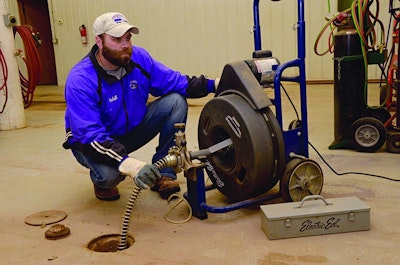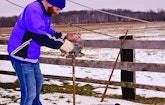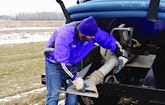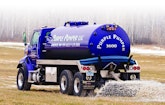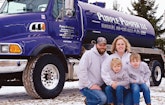Interested in Plumbing?
Get Plumbing articles, news and videos right in your inbox! Sign up now.
Plumbing + Get AlertsThere are clear benefits to a husband and wife working together in a small-scale pumping business. Spouses with complementary skills can bring individual talents to the partnership and keep the work flowing smoothly. Ardell and Janelle Kick, of Purple Pumper in Hinckley, Minn., enjoy that kind of winning teamwork. Ardell works tirelessly in the field while Janelle brings organizational skills to the office and is always available to troubleshoot when a customer calls with an emergency.
Located midway between Minneapolis-St. Paul and Duluth to the north, the Kicks serve two rural counties with the majority of their workload consisting of residential septic service. A frosty northern climate – with bone-chilling work conditions and a long winter slowdown – presents constant challenges to consistent profitability.
The couple purchased the business 10 years ago after Ardell worked for another area wastewater contractor. Ardell’s industry background equipped him well for educating customers. He explains how septic systems work and he performs basic maintenance and repairs. They are a two-truck, one-driver family operation. Janelle, in addition to running their home office, also raises their two young sons until dad gets home at night.
“It can clearly be a plus and a minus sometimes dealing with two rambunctious kids while you are trying to talk to customers,’’ she says. “But it’s been fun having a lot of our return customers – who have been with us a while and have kids of their own – now ask how our kids are doing.”
Though the Kicks have just started their website marketing, they still rely mostly on word-of-mouth and their purple truck to draw customers. Aside from typical residential work, they pump a lot of tanks at summer cabins and campgrounds.
Purple Pumper land-applies all the septage they collect as the local municipal treatment facilities will not take the loads. To ensure enough farmland for the inputs, they contract with several farmers for spreading and also use Ardell’s family’s farm.
BACKUP TRUCK IS CRITICAL
The Kicks attended the 2014 Pumper & Cleaner Environmental Expo International (now called the Water & Wastewater Equipment, Treatment & Transport Show), where they shopped the exhibit floor for a service truck. They made a connection with Imperial Industries and had a used truck built to ensure they will always be ready to respond to customers during the busy summer. Without two solid trucks on the road, a breakdown could mean significant lost revenue, according to Janelle.
“We can’t be shut down because we have winter to contend with,” she says. “We work from April to December as hard as we can and then we are essentially off for the winter. If you don’t work in the sunshine and make your money, you struggle. It benefits us greatly to have two trucks.”
Ardell has been pumping with a 1998 Sterling truck with a 3,500-gallon steel tank and a Jurop/Chandler R260 pump. The older rig will now be relegated to a backup service role. Imperial recently built out a 2005 Sterling chassis with a 3,600-gallon steel tank and a Jurop/Chandler LC420 pump that will become the go-to truck for the upcoming season.
Purple Pumper also has a power jetter and line-cleaning machines they keep in an enclosed trailer. They are a J2900 General Pipe Cleaners Jet Set, an Electric Eel Model C and an Electric Eel Model D-5. They also use a Crust Buster tank agitator.
In addition to pumping, the company performs minor tank repairs and upgrades, such as adding concrete risers and lids from Knife River Corporation or replacing lift pumps with models from Zoeller Company or Goulds. But Ardell says he stops short of digging up drainfields. Ardell has a cooperative agreement with onsite installers, sending referrals back and forth as needed. “I used to do installations,” says Ardell. “So I know all the guys and I work with them all the time, pumping tanks out for them. I refer work to a couple of them depending on where the job is located.’’
WINTER WONDERLAND
A deep snow cover in their territory during the cold snap of 2013-14 was a blessing, providing insulation for septic systems. In many Minnesota regions, however, there wasn’t enough snowfall to prevent freeze-ups and there were many emergency calls for pumpers when temperatures hit below zero for more than 50 days.
Winter is the roughest time of the year to run a septic service business, the Kicks agree. While work slows considerably in the first few months of the year, Purple Pumper is busy in December as customers want to get work done before the holidays.
Despite the cold, Ardell must have the flexibility to move while he’s working, especially in the clothes he wears.
“I don’t wear anything special for the cold; in fact, I try to dress as lightly as possible. I usually wear hunting boots as they are basically a waterproof hiking boot. I also wear regular jackets.’’
The cold can make work uncomfortable and it also poses dangers. Ardell recalls an incident working in temperatures at -10 degrees that left him with a broken finger and a stranded truck.
“I got a rock stuck in my hose. Because I could no longer feel my fingers, I could not feel the rock as it was slipping out of the hose,’’ he explains. “It nearly took my finger off when it finally came out. Trying to get obstructions out of pipes or equipment is one way to easily break fingers.’’
And that’s what happened. Ardell had to go to the emergency room.
“There sits your truck full of septage in someone’s driveway when it’s -10 degrees. This is not something workers have to deal with in warmer regions,” he says.
Because Ardell had a cast on his arm that day and was unable to drive the truck, his father, Dennis, had to move the truck. Ardell has also had days when it took him three to four hours to get home when it should have taken an hour due to freezing rain on the roads or other extreme weather. On days where he’s hit with treacherous weather, Ardell finishes only two to three jobs when he’s used to pumping 10 to 12 tanks on a good day.
SIMPLE MARKETING, GOOD SERVICE
The Kicks employ a number of marketing techniques to build their rural business. For one, they leave refrigerator magnets promoting the business with everyone they meet. These are produced by Stamp Works. The Kicks have yet to see a huge response from the website they developed, but it is still fairly new. For their situation, a phone book ad, word-of-mouth recommendations and the distinctive truck are the best advertising.
“I feel that our personalized service, getting a live voice on the phone rather than waiting for a callback, is a big plus,” says Janelle. “Giving people that personal connection is the thing that we especially like to focus on.”
Janelle takes the majority of the calls. Her ability to get to the root of the customer’s problems and quick response from Ardell translates to customer satisfaction.
“Janelle has a good memory and we get quite a few regulars who call, so that memory can come in handy,” says Ardell. “All I can say is that personal attention on the phone really helps our business, any business. Being on the phone and having excellent records is important so that you are not losing any customers due to their frustration in attempting to make phone contact.
“When you have too many customers you can be too busy and client service may start to suffer,’’ he continues. “We try our best to take care of people who have been loyal to us. You always want to keep your core customers.”
If customers are home when he arrives to pump a tank, Ardell takes time to educate them on how the system works. He tells homeowners what their tanks should look like and shares maintenance tips. He knows customer education is another key in providing good service and keeping septic systems in top shape.
LOOKING FORWARD
The Kicks have thought about expanding by adding another technician, but inconsistent workload throughout the year is a challenge to growth.
“We have the potential to have enough work for an additional employee, but not always on a regular basis as we pretty much shut down during the winter; so you would have to lay that person off,” Janelle says. “Also, working from home, I wouldn’t be able to handle running two schedules if we got an employee, so we are OK with the size of our business.”
“Right now we have plenty of business to keep us busy for our size,’’ Ardell adds. “But I also don’t want to sugarcoat things. This is tough, grueling work. Lifting equipment and hoses on and off the truck all day is not for the faint-hearted.’’
It’s hard work, but pumping is a gratifying business for this husband-and-wife team. At the end of a long day of service calls, they feel like they’ve helped people and made a good living for their family.
“You have to have a good attitude,’’ Ardell says. “Be realistic, practical and always know each day when you go out there that this is tough, challenging and important work that needs to be done.”
